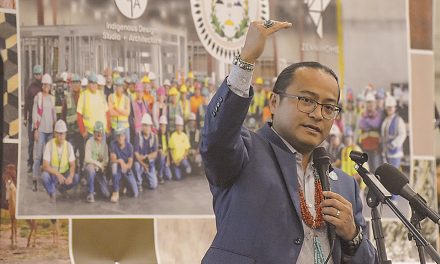
Letters | Equity, fairness needed with ARPA funding

It is good that 10% of the American Rescue Plan Act funding was set aside for administrative purposes; over $200 million with the creation of the Fiscal Recovery Fund office to prepare for the expenditure of ARPA funding on infrastructure and community-based projects.
Now personnel positions will need to be created to execute hundreds of projects by 2024 into 2026. We need law, archaeology, community planning, accounting and environmental students, project managers, clerks, right-of-way agents, mapping technicians and, above all, local community builders.
Also quick responses from everyone is necessary, especially through electronic mailing.
The collaboration between the FRF office and various offices of the Navajo Nation government with the 110 chapters will continue with Navajo Tribal Utility Authority and other tribal enterprises with federal offices. For those who worked diligently on planning, assessing and acquiring needed documentation on projects for the bill (No. 0257-21), they will have a head start.
This is an extraordinary time for the central government to work cooperatively and diligently with chapter communities on waterline/bathroom additions, electrical, telecommunication, fixed wireless and broadband services, rural addressing/E-911, renewable energy projects, housing, and other forms of infrastructure and community-based projects with the hope that not everything is denied or delayed.
Equity at $41-plus million per Council district is needed. Introduced amendments to the bill propose to equally split the ARPA funding among Council districts to be apportioned to chapters with a 50/50 formula (census population with registered voters), while setting aside additional funding for behavioral health, public health and transitional housing.
It should be noted that the 2020 census count for chapters is unreliable. There are chapters showing far less than the real local population. Recommendation is to use the data from the Hardship Assistance since each applicant was asked which chapter one is affiliated with.
Some are saying that equity will lead to the misuse of ARPA funding such as what occurred in 2010 with the Navajo Nation discretionary fund that delegates and the president of the Navajo Nation had access to.
Federal funding, such as ARPA, has its requirements and with that comes the extra task of monitoring at ground level, especially when working with chapter communities.
It’s also important for the nation to convince and justify to the federal government the uniqueness of the geographic area we live in when it comes to planned community-based projects that attend to health, the land and preparing communities.
For those concerned about equity, a consideration should be made on a deadline in 2024 for using ARPA funding and any unused funds revert back to the ARPA pot to be portioned out to projects that need additional funding. In this way, everyone is taken care of on projects.
I believe it is time to lobby all delegates and the president of the Navajo Nation. We need equity and fairness. We can do this. Now is the time for all to step up to the plate and not say we can’t.
Percy B. Anderson
Manuelito, N.M.
Rehoboth hospital services severely compromised
Seventy percent of the patients at Rehoboth McKinley Christian Hospital are Native American, as are a substantial portion of the staff.
For the last 1.5 years, the management of the hospital was outsourced to a company called Community Hospital Corporation. Since then, CHC has not prioritized community needs, patient safety, or staff culture and retention.
Instead, under CHC’s leadership, patient access has been severely compromised, 65% of nurses and 40% of permanent physicians have resigned, and the hospital has faced unprecedented financial losses. The Board of Trustees does not include a single Native American person.
We are cautiously optimistic about the recent developments at RMCHCS, including the hiring of a new CEO, Robert Whitaker. Further, the McKinley County Commission took actions to demand increased transparency and accountability by the Board of Trustees. We look forward to the arrival of Mr. Whitaker, and look forward to working with him to rebuild the community’s trust in RMCH.
We are concerned that the CEO, CFO, CNO and director of human resources are still employed by CHC. We continue to believe that termination of the management contract between CHC and RMCHCS (which does not expire for another two years) is the only way to begin to rectify the situation and to allow RMCH leadership to serve the community, not corporate interests.
The county commissioners have an obligation to follow through on their important, bold decision with specifics that will result in meaningful change. Our community group (Community Health Action Group) has proposed reasonable measures to provide sorely needed taxpayer accountability and oversight with regard to hospital operations.
We recommend the reconfiguration of the Board of Trustees to be majority representative of the community and the formation and implementation of a Community Advisory Board. Both of these recommendations are standard practices for the governing boards of small, rural hospitals.
We view these as critical steps for healing the rift between the community and RMCH.
Together, we must remain vigilant in our quest for a community-forward, patient-centered, fully functioning hospital.
Readers, please sign our petition at RMCHisOurHospital.org.
CHAG Core Committee:
Rose Eason, Dr. Caleb Lauber, Dr. Connie Liu, Dr. Kathy Mezoff, Brett Hartline, Jean Philips, Sara Pikaart, Dylan Solomon and Gwen Wilson
Gallup, N.M.








 Highway 264,
Highway 264, I-40, WB @ Winslow
I-40, WB @ Winslow